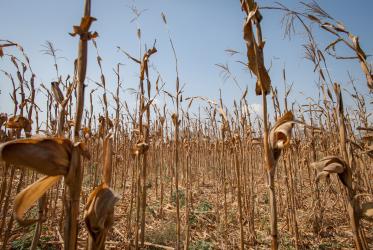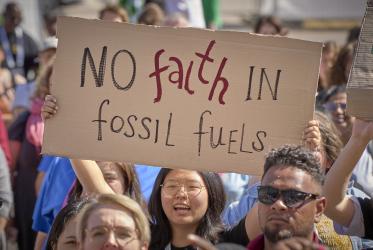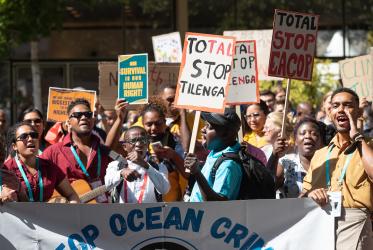Delivered 13 Dec. 2009
Lobby Dinner, Copenhagen
Hosted by the WCC, Dan Church Aid and APRODEV
Invited guests included UN negotiators, government and church officials
Dear Ministers, delegates, and leaders from the global ecumenical civil society. I would like to welcome you all to this informal dinner, taking place in the midst of one of the most important meetings of our time.
I welcome you to this dinner on behalf of a broad network of faith-based stakeholders following the current climate change negotiations.
Our concern for the climate is genuine and rooted in the experiences of millions of people who are most vulnerable to and already experiencing the effects of climate change. There are churches from all over the world and church based NGOs working in cooperation with other NGOs and community groups on grassroots level.
Those faith leaders present here tonight all share a strong concern based on listening to and being in dialogue with our constituencies. Yet, we are concerned on behalf of all the people who suffer because of climate change. We want to keep the focus on these individuals, as the impact of climate change for many is a question of life or death. For others it is a question of whether they can continue to develop their communities and emerge from a lifetime of poverty.
A week of negotiations has been completed and the conference now moves into a new phase with attendance on the ministerial level from many countries. From our perspective the coming days are crucial.
The first week did not lead to any breakthrough and on many topics further development since the Bali road map was adopted two years ago has been minimal. On the other hand, since Bali, the public debate about climate change has evolved and increased. As faith leaders, we experience not only a growing interest in climate change issues, but a deep concern for people around the world, from Ethiopia and eastern Africa, my home, where droughts are hitting the region again to Norway, where there is an increasing awareness of the impact the western policies have on climate change.
This increasing public concern is an indication of how important this issue is. And as we listen to our church members and the members of other religious communities, the momentum of so many voices calling for action has created a window of opportunity for you to reach agreements on a real and ambitious outcome. The people are ready. Our churches are ready. Are you ready to move forward?
One of the main topics of discussion during the last week has been the format of the expected outcome from the meeting. This discussion is certainly important but we are concerned that this discussion may now overshadow what really needs to be done in order to achieve a successful outcome of these negotiations. The necessary actions for Copenhagen were set in Bali, and emphasized in Poznan and the two-track approach has been running for two years.
For us in the faith communities, we call on you to work for a legally binding, ambitious and fair deal as an outcome of COP 15. We hope that the focus in the coming week will be on the content of the Bali road map, which means substantive progress within the mitigation, adaptation, technology and finance negotiation tracks.
We acknowledge the conclusions from IPCC and based on those, it is clear that the level of ambition must be drastically increased.
First, reaching the target of maximum 2 degrees Celsius temperature rise, or preferably 1,5 degree as proposed by many parties, is only possible if ambitious targets are set for emission reductions on both short and long term. Emissions cuts of 25-40 % by 2020 in relation to the 1990 levels must be ensured and it is in the interest of all parties that this is accomplished without loop holes which may erode the effects of any agreement.
Second, as faith movements rooted in communities around the world we are also aware of the difference in capacity and historic responsibility related to climate change. We believe it is of utmost importance that developing countries need substantial financial and technological support to be able maintain their possibility for economic development. This support is needed both in the short term, to address the need for immediate assistance to adapt to a changing environment- including disaster events and slow-onset changes, and for long term solutions- to decrease emissions and to build societies with capacity to adapt to new conditions.
Finally, climate change negotiations are not just talk about the weather or changing climatic conditions; they are negotiations about equity, justice and the equal right to development. It is our strong belief that an agreement must be based on these principles, as any alternative will only emphasize the existing divides between rich and poor in the world. We seek climate justice.
We have given the dinner the heading "Faith, development and climate justice - an informal dinner between key UNFCCC parties and international church leaders." I hope that we will enjoy this dinner as an informal and relaxed moment in the midst of intensive negotiations, with a possibility to exchange views on equity, climate change and the concern of people, individuals and faith constituencies all around the world.
We are sincerely grateful that you have joined us here tonight and we know that the faith community will work closely with you as a partner and advocate.
The earth is the Lord’s and all that is in it. We are the stewards of God’s creation. It is our responsibility to change the course we are following. We bring this message to you from our member churches across the globe representing nearly two billion people- reach a binding, ambitious and fair deal this week and offer new hope to those around the world who look to you for a new way and who hope they can continue to develop themselves, their families and communities. The opportunity is here. Let us take it now.



